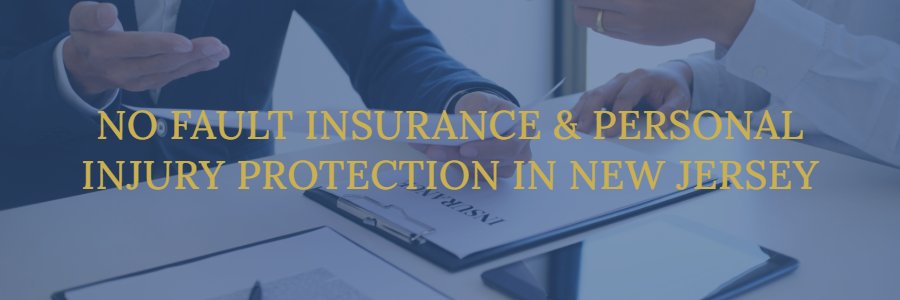What Is Personal Injury Protection Insurance?
New Jersey is a no-fault state. This makes personal injury protection (PIP) insurance mandatory for all drivers. After an auto accident, injured drivers will seek compensation from their own PIP insurance coverage – regardless of fault for the collision. Personal injury protection, also known as “no-fault” insurance is what covers a driver’s damages in a first-party claim. Learning more about personal injury protection insurance can help you successfully navigate the claims process after a collision in New Jersey.
What’s The Difference Between Personal Injury Protection & No Fault Insurance?
Personal injury protection and no fault insurance are one in the same. In certain states within the U.S., it may be called personal injury protection or no-fault insurance.
In New Jersey – personal injury protection helps individuals that have suffered injuries cover the costs of medical bills associated with the accident. In the event that an individual is riding in a vehicle of a policy holder, and is injured in a car accident in the policy holder’s car, the individual injured in the passenger seat will be able to have their medical bills covered by the driver’s personal injury protection plan.
New Jersey requires no fault insurance to be purchased by all drivers in the Garden State. Regardless of fault of the accident, no-fault insurance will pay for medical expenses regardless of fault.
What Does PIP Insurance Cover?
Personal injury protection insurance is a type of no-fault coverage. It reimburses a driver and his or her passengers for their medical bills and lost wages after an auto accident, even if the victim was at fault for the collision. PIP will also cover losses for a policyholder who is injured as a vehicle passenger, bicyclist or pedestrian. A PIP policy can cover several different types of damages for a claimant.
- Past and future medical care
- Hospital stays
- Doctor’s (and specialists) appointments
- Surgeries and rehabilitation
- Physical therapy
- Ongoing live-in nursing care
- Homecare expenses
- Lost wages from an injury
- Funeral and death benefits
Many of these coverages may overlap with other insurance policies you have, such as your health insurance coverage or Medical Pay auto insurance. However, PIP coverage is specifically meant to cover car accident injuries. PIP can pay for your medical bills and other losses even if your other forms of insurance deny coverage.

What Is The Difference Between Liability Insurance & Personal Injury Protection in New Jersey?
Liability insurance in New Jersey pays other parties involved in the accident for damages caused by the at-fault party. Liability insurance does not cover medical expenses.
Personal injury protection is the policy that pays for medical bills for individuals involved in accidents and facing medical bills. Individuals that are covered under the driver’s no-fault insurance plan can expect coverage for medical expenses up to the policy limit for medical treatment regardless of fault.
What Are the Required Amounts of Insurance in New Jersey?
Every state in the country requires drivers to carry minimum amounts of automobile insurance. The types and amounts of insurance required, however, differ from state to state. Failing to purchase at least the minimum amounts of insurance as a driver can result in penalties such as driver’s license suspension and a fine. In New Jersey, personal injury protection is just one type of insurance required by law.
- At least $15,000 per person and $30,000 per accident in bodily injury liability
- $5,000 per accident in property damage liability
- Personal injury protection (no-fault coverage)
Optional types of coverage include collision, comprehensive and uninsured motorist insurance. After a New Jersey car accident, you will seek coverage from your own PIP policy. If you have grounds to file a claim with someone else’s insurance company, however, you may use that party’s liability insurance coverage instead. You will only bear the right to sue in limited situations.
Rights to Sue
The main benefit of personal injury protection insurance is the ability to file a claim and receive compensation right away, without having to prove fault. You can recover even if you were to blame for the car accident. One drawback, however, is that you lose the right to hold the at-fault party responsible, in most cases. The only exceptions are if you are injured enough to meet New Jersey’s serious injury threshold or if you purchased unlimited right to sue insurance.
Limited right to sue insurance only allows you to hold someone else responsible for a serious injury, such as a broken bone or permanent disability. The unlimited option, however, gives you grounds to file a third-party insurance claim regardless of the gravity of your injuries. You may need a Hackensack personal injury attorney to help you determine whether you have grounds for a third-party lawsuit after a motor vehicle accident depending on your coverage.
If you have the ability to file a third-party claim, it could result in greater compensation than a PIP claim with your own provider. A third-party car accident claim could repay you for pain and suffering and emotional distress, for example, as well as punitive damages. This is why many drivers in New Jersey pay extra for unlimited right to sue insurance. Consult with a car accident lawyer for more information about your case.
